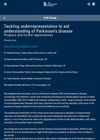Search
for
Sort by
Research
720-750 / 1000+ results
research Intrinsic and Extrinsic Factors Associated with Hair Graying and Therapeutic Potential of Plant Extracts and Phytochemicals
Plant extracts may help prevent or reverse hair graying.
research Increasing GSH-Px Activity and Activating Wnt Pathway Promote Fine Wool Growth in FGF5-Edited Sheep
Editing the FGF5 gene in sheep increases fine wool growth.

research Aligning Stem Cell Models and Postmortem Studies to Query Striatal Neurodevelopment in Schizophrenia
Schizophrenia risk genes may affect early brain development, contributing to the disease.

research Autophagy Dysfunction: The Kernel of Hair Loss?
Manipulating cell cleanup processes could help treat hair loss.

research Androgenetic Alopecia: A Review
Androgenetic alopecia is a common hair loss condition influenced by various factors and linked to psychosocial and cardiovascular issues.

research Toupee or Not Toupee? Social Perceptions of Male Pattern Baldness
Wearing a toupee makes men seem more attractive and slightly healthier, but doesn't change how confident they appear.

research The Biology and Genomics of Human Hair Follicles: A Focus on Androgenetic Alopecia
Hair loss in Androgenetic Alopecia is caused by genetics, aging, and lifestyle, leading to hair follicle shrinkage and related health risks.
research Placental mRNA Expression of Neurokinin B Is Increased in PCOS Pregnancies with Female Offspring
Pregnant women with PCOS have higher levels of Neurokinin B in the placenta, especially with female babies.
research Identification of N6-Methyladenosine-Related Factors and the Prediction of the Regulatory Mechanism of Hair Follicle Development in Rex and Hycole Rabbits
N6-methyladenosine affects hair follicle development differently in Rex and Hycole rabbits.

research Boron Deficiency Responses in Maize (Zea Mays L.) Roots
Boron deficiency in maize affects leaf boron levels and nutrient uptake differently depending on root hair presence and soil type.

research Pediatric Features of Genetic Predisposition to Polycystic Ovary Syndrome
Genetic risk for PCOS can affect children's growth, metabolism, and development from early life into adulthood.

research Diagnosis And Management Of Alopecia Areata: A Saudi Expert Consensus Statement (2023)
Experts recommend personalized treatment plans for best outcomes in managing Alopecia Areata.

research The Progress in Bioprinting and Its Potential Impact on Health-Related Quality of Life
Bioprinting could greatly improve health outcomes but faces challenges like material choice and ensuring long-term survival of printed tissues.

research An Update in the Management of Alopecia Areata
New treatments for alopecia areata show promise, but more research is needed to confirm their effectiveness.

research Testosterone: The Male Sex Hormone
More research is needed to understand how testosterone is maintained in adult males.

research Overview Of Alopecia Areata For Managed Care And Payer Stakeholders In The United States
Alopecia areata causes hair loss and life quality issues; current treatments are often unsatisfactory, but new drugs like JAK inhibitors show promise.

research Review of Efficacy of Baricitinib in the Treatment of Alopecia Areata
Baricitinib is a promising treatment for severe alopecia areata with minimal side effects.

research Current Understanding and Treatment of Sex Hormone-Related Hair Diseases
Sex hormones affect hair growth and loss, and treatments for related hair diseases include various medications, hair transplantation, and light therapy.

research Discovery of Autoantigens in the Hair Loss Disorder Alopecia Areata: Implications of Posttranslational Modifications
Scientists are still unsure what triggers the immune system to attack hair follicles in Alopecia areata.

research Ideal JAK Inhibitor for Alopecia Areata: Baricitinib, Tofacitinib, Ritlecitinib, or Ifidancitinib - Revisiting the Immunomechanisms of the JAK Pathway
No single ideal JAK inhibitor for alopecia areata has been determined; JAK3 inhibitors may be promising with fewer side effects.

research Dermatological Manifestations of Patients with COVID-19: A Cross-Sectional Study
COVID-19 can cause skin problems.

research Alopecia Areata: A Review of Diagnosis, Pathogenesis, and the Therapeutic Landscape
New treatments for alopecia areata show promise, but standardized guidelines are needed.

research Rare and Underappreciated Causes of Polycystic Ovarian Syndrome
Some lesser-known causes of PCOS include autoimmune issues, genetic mutations, and changes in the body's microbiome.

research Tackling Underrepresentation to Aid Understanding of Parkinson’s Disease: Progress and Further Opportunities
Increasing research diversity is key for better understanding and treating Parkinson's Disease.
research Ectopic Olfactory Receptors in Humans: New Therapeutic Possibilities
Olfactory receptors found outside the nose may offer new treatments for diseases like cancer and help in wound healing and hair growth.
research Topical JAK Inhibitors for the Treatment of Alopecia Areata and Vitiligo
Topical JAK inhibitors can effectively treat alopecia areata and vitiligo by modulating immune responses.

research Clinico-Pathological Correlation in Indian Women Presenting with Cutaneous Features of Hyperandrogenism: A Cross-Sectional Study
Indian women with skin signs of high male hormones often have related health issues.
research Comorbidities in Androgenetic Alopecia: A Comprehensive Review
Androgenetic alopecia is linked to heart disease, metabolic issues, and mental health problems.

research Cells and Structures Involved in Hair Follicle Regeneration: An Introduction
The document concludes that hair follicle regeneration involves various factors like stem cells, noncoding dsRNA, lymphatic vessels, growth factors, minoxidil, exosomes, and induced pluripotent stem cells.